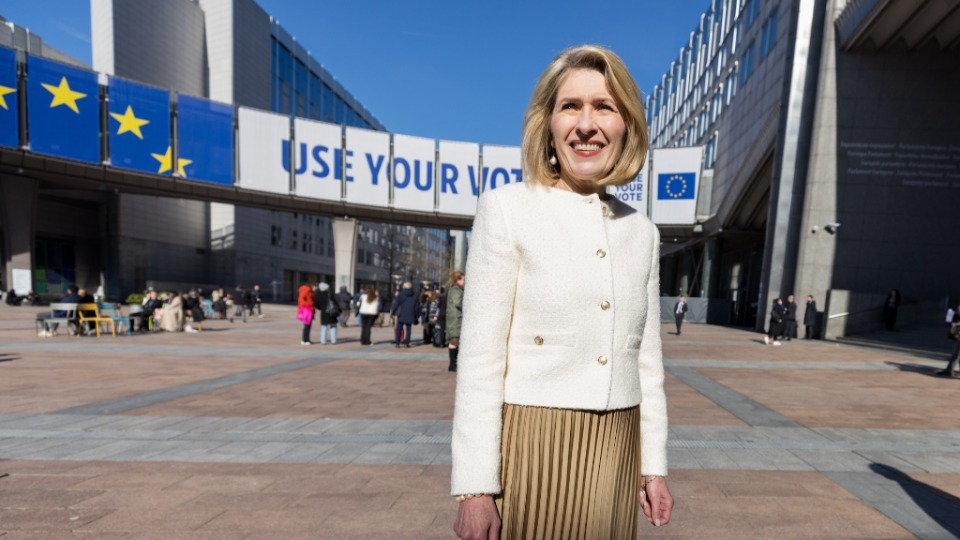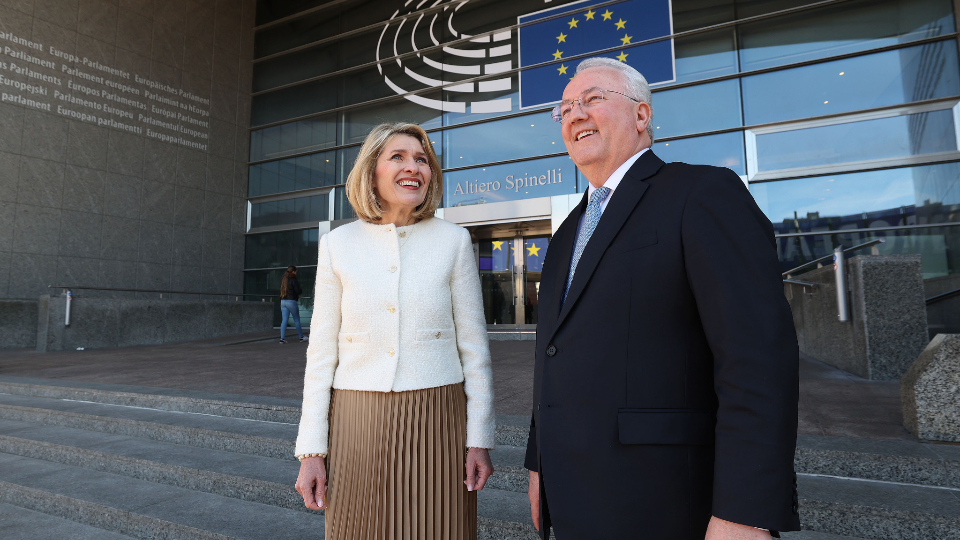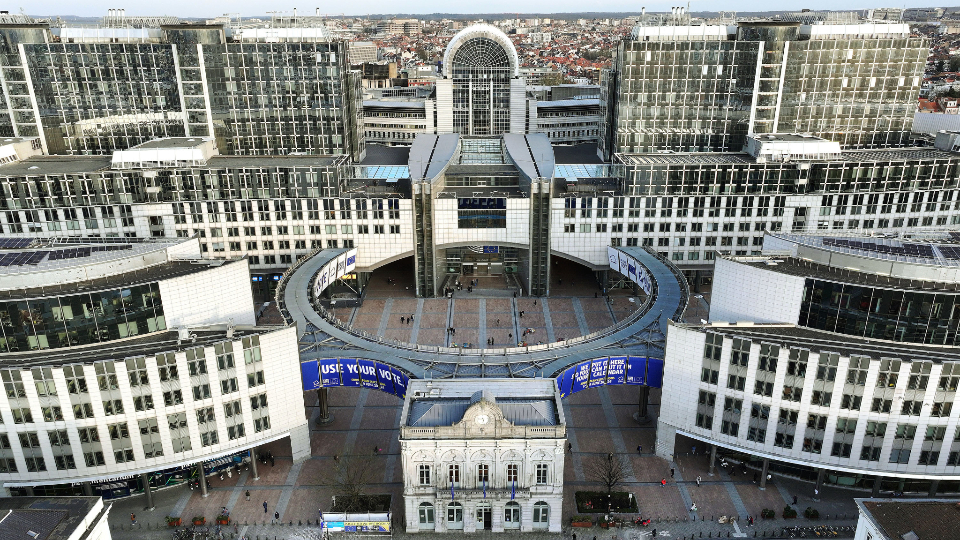“Religious freedom of women is a key component to global peace,” Relief Society General President Camille N. Johnson said in an address to the European Union Parliament in Brussels, Belgium, on Monday, March 4, in anticipation of International Women’s Day on March 8.
The European Parliament represents 450 million people who live in the European Union, known as the EU, and influences its 27 member states and the 180 nations who have embassies in Belgium. The event was hosted by Ms. Anja Haga, a member of the European Parliament, in partnership with the EU & International Affairs Office of The Church of Jesus Christ of Latter-day Saints in Brussels. Presentations covered different perspectives of freedom of religion and belief and included two panel discussions.
Quoting Church President Russell M. Nelson, President Johnson said that women “have been blessed with a unique moral compass” and possess “special spiritual gifts and propensities” to sense human needs.
“Our implicit sisterhood creates an ability to build on common ground, which forms the basis of peace — a peace that is more than mere coexistence in the absence of war — but something much more beautiful and powerful, bringing individuality into a unified whole,” she said.

SisterJohnson_EUParliament_01
Relief Society General President Camille N. Johnson of The Church of Jesus Christ of Latter-day Saints prepares to enter the EU Parliament in Brussels, on March 4, 2024. © 2024 by Intellectual Reserve, Inc. All rights reserved.Empowering women’s freedom of religion and belief helps women to achieve their highest aspirations. But when societies and governments restrict religious freedoms, the resulting conflict and violence harms women and children the most.
President Johnson acknowledged that abuse against women and the recruitment and radicalizing of populations in name of religious freedom are extreme examples and “warning signs,” but are not reasons to restrict religious freedoms, which are stabilizing and empowering influences. “We must better communicate with and actually empower our sisters in these desperate situations to reach across social divisions to solve problems,” she said.
“Our greatest success will be in unleashing the power of our global sisterhood by unleashing the power of women as expressed through faith and conscience,” she said.
Regardless of faith tradition or spiritual background, women tend to express faith through serving others. This faith-motivated action, combined with the efforts of other women of faith across all cultural divides, “will empower the peacemaking capacity of our global sisterhood.”
“The sisterhood of women, unburdened by prejudice and oppression, can unite across boundaries through the simplest of acts,” she said.
“I believe that the most important and impactful work of women continues to be done when we care for our own children, teach a friend to read, patiently address the needs of an elderly neighbor, prepare a meal for the sick, or cry with a sister who is grieving.”
In addition to the efforts made in the past decade to aid refugees regardless of ethnicity or religious background, President Johnson shared examples of how the Relief Society, the Church’s worldwide organization for women, is leading a Churchwide humanitarian initiative that addresses the basic needs of women and children. “We collaborate with other global organizations to prioritize maternal and newborn care, child nutrition, immunizations, and education throughout the world,” explained President Johnson.
- Johnson-EU-Parliament
- Johnson-EU-Parliament
- Johnson-EU-Parliament
- SisterJohnson_EUParliament_05
- SisterJohnson_EUParliament_01
- SisterJohnson_EUParliament_02
- SisterJohnson_EUParliament_03
- SisterJohnson_EUParliament_07
- Johnson-EU-parliament
- SisterJohnson_EUParliament_06
- SisterJohnson_EUParliament_08
- SisterJohnson_EUParliament_01
- EUJohnson.chn_ja_00017.JPG
| Temple Square is always beautiful in the springtime. Gardeners work to prepare the ground for General Conference. © 2012 Intellectual Reserve, Inc. All rights reserved. | 1 / 2 |
She shared how a local Church-led project to screen Latter-day Saint Filipino children for malnutrition led to the Church’s support of organizations that treat and prevent malnutrition throughout the Philippines. More than 14,000 children have been screened for malnutrition, and the effort is now being implemented in over a thousand congregations in 12 countries, she said.
While it is impossible to reach every person in the world through programs and policies, “through our global sisterhood, we can reach every single soul,” she said.
“Reaching across faith boundaries builds peace and empowers our global sisterhood,” President Johnson concluded. “Friends, we can achieve what no government can: a global sisterhood of peacemakers.”

Johnson-EU-Parliament
Relief Society General President Camille N. Johnson and Elder Jack N. Gerard, a General Authority Seventy and Second Counselor in the Europe Central Area Presidency of The Church of Jesus Christ of Latter-day Saints, visit in front of the European Union Parliament building in Brussels, Belgium, on Monday, March 4, 2024.All rights reserved.Elder Jack N. Gerard, a General Authority Seventy and Second Counselor in the Europe Central Area Presidency, who attended President Johnson’s speech, said the invitation for President Johnson to speak “underscores the significant role our sister leaders play on the world stage.”
This is the second time the Church’s Relief Society General President has addressed parliament in Belgium.
Sister Jean B. Bingham, former Relief Society General President, spoke at the European Parliament in November 2017 — declaring that “religious freedom is a critical right for empowering women.”
She and her husband, Elder Bruce Bingham, are now serving a mission as government relations representatives in Brussels.

EUJohnson.chn_ja_00017.JPG
The European Union Parliament building in Brussels, Belgium, on Monday, March 4, 2024.All rights reserved.The first panel discussion centered on the resilience of women around the world and their stories in the pursuit of freedom of religion and belief. Speakers included Rachel Bayani, representing the Bahá’í International Community; Helene Fisher, advocacy officer for Gender and Religious Freedom; and Anastasia Hartman, representing Open Doors International.
The second panel focused on presenting strategies and solutions to promote women’s rights within the context of freedom of religion or belief. Carolyn Handschin, President of the NGO Committee on the Status of Women in Geneva, offered insights of the contribution of civil society organization within the framework of the United Nations. Susan Kerr, Senior Advisor on Freedom of Religion of Belief from the OSCE’s Office for Democratic Institutions and Human Rights, shared the importance of the security component in the exercise of one’s freedom of religion.
Francesco Di Lillo, Director of the Church’s EU and International Affairs Office in Brussels, who moderated the panel, said he hopes “this event will spark more dialogue and collaboration among religious and political leaders, as well as civil society, to promote and protect the religious freedom of women around the world.”
At the conclusion of the event, Anja Haga, who hosted the event, said, “If we want peace, we have to stand for freedom of religion. And you have to fight for freedom of religion for women. That’s how you establish peace in the world.”